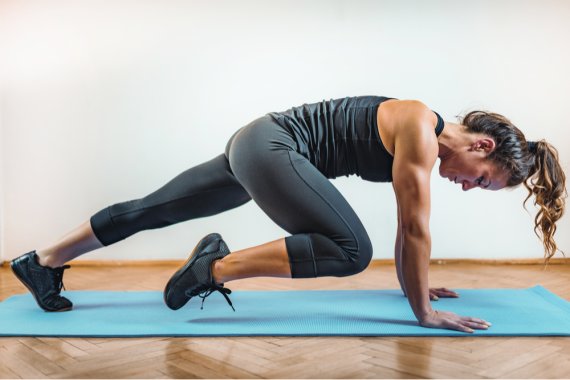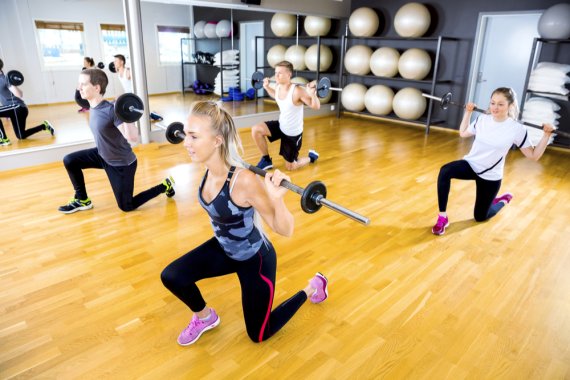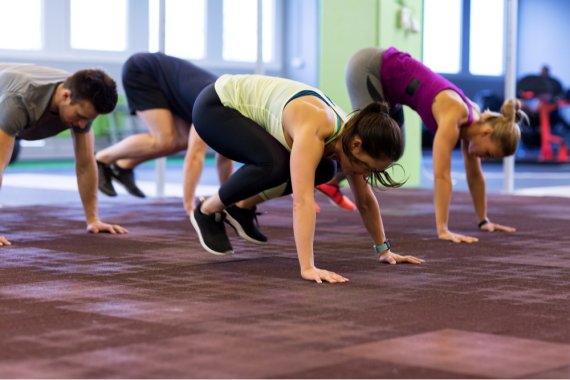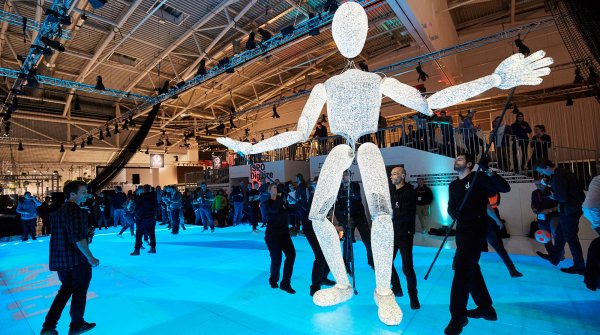
First of all, we need to clarify what "HIIT" is all about: It is a highly intensive form of training in which short intervals of stress are alternated with breaks of varying lengths. The duration of the load can range from five seconds to several minutes and can be performed over one or more laps. The choice of exercises is also varied:
You can always do the same exercise (e.g. in endurance training) or combine different exercises (e.g. for a whole-body strength training).
HIIT training often aims at a certain ratio of load to rest. The range is wide: you will often find a 1:2 ratio (e.g. 20 seconds load with 40 seconds break). This ratio is mainly used for beginners or very demanding exercises like sprints. The golden mean in the form of a 1:1 ratio where the load and rest are of equal length (e.g. 30 seconds load with 30 seconds rest) is often used for strength exercises or mixed training. The sporty 2:1 ratio, in which the load is twice as long as the break (e.g. 20 seconds load with a 10-second break) brings even well-trained sportsmen into sweating and is used especially for highly intensive endurance training.

Why is HIIT enjoying such popularity? The main advantage of HIIT is its (time) efficiency. One can set strong training stimuli in only a short time. Also, it can be used variably depending on the training goal for strength, endurance or a combination of both.
The effects of HIIT are sometimes even stronger than with "traditional" training - for example, it strengthens the heart muscle more effectively than the usual endurance training. The heart even grows in a physiologically sensible way (so-called "sports heart") and is, therefore, more resilient. The other muscles of our body also benefit. HIIT causes an increase in so-called mitochondria in the muscle. These cell components supply the muscle with energy - more of them enable our muscles to have a better energy supply and at the same time to use more energy. HIIT therefore simultaneously increases muscle endurance and energy metabolism.
But that's not all: the energy consumption by HIIT itself does not end with the training session: "E. P. O. C.“ (Excess Post-exercise Oxygen Consumption) or "afterburning effect" also increases energy consumption during regeneration of the high-intensity HIIT units. The musculature and circulation simply cannot fully recover during the high-intensity exercise.
HIIT also has its advantages in terms of power: It enables an effective whole-body training of all muscle groups in a short time. At the same time, even with strength exercises, there is still an endurance training effect due to the load intervals.
If you combine strength and endurance exercises, you have a real all-rounder method at your fingertips. The excuse "no time for training" can thus be a thing of the past.

With all the advantages that HIIT offers, however, caution is advised, especially for beginners: The high training intensity is a great challenge for many. Especially the clean and precise execution of exercises is not always guaranteed. Therefore beginners should rather choose shorter intervals in combination with longer breaks. This is where controlled exercises using your own body weight are particularly useful. Good examples would be push-ups, knee bends and static holding exercises. Jumps and unstable body positions should be avoided at the beginning. Later, even devices such as dumbbells and barbells can be used.
High Intensity Interval Training is part of our Top Trends 2020: The versatile training method allows for time-efficient training of both strength and endurance. With a program tailored to the individual training level, nothing stands in the way of improved fitness - not even the notorious lack of time.
 Know-HowThe 11 Best TRX Exercises
Know-HowThe 11 Best TRX Exercises
- ISPO awards
- Mountain sports
- Bike
- Design
- Retail
- Fitness
- Health
- ISPO Job Market
- ISPO Munich
- ISPO Shanghai
- Running
- Brands
- Sustainability
- Olympia
- OutDoor
- Promotion
- Sports Business
- ISPO Textrends
- Triathlon
- Water sports
- Winter sports
- eSports
- SportsTech
- OutDoor by ISPO
- Heroes
- Transformation
- Sport Fashion
- Urban Culture
- Challenges of a CEO
- Trade fairs
- Sports
- Find the Balance
- Product reviews
- Newsletter Exclusive Area
- Magazine



